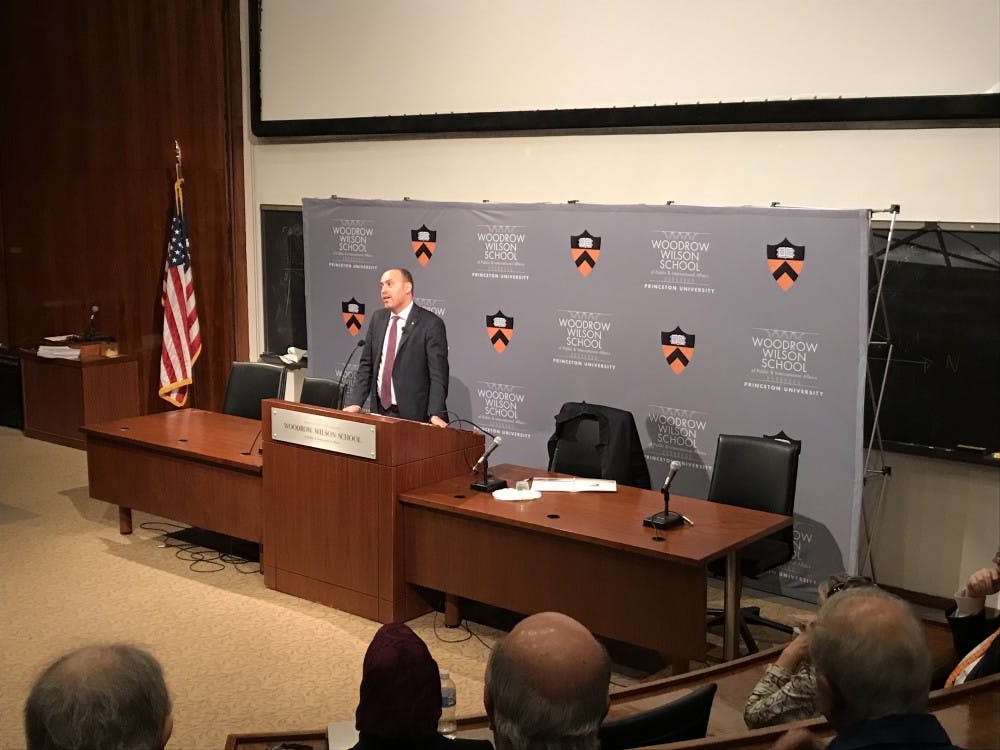Palestinian ambassador to the U.S. Husam Zomlot was born as a refugee in a tent in the Gaza Strip. Today, Zomlot spoke at the Wilson School about a multilateral solution to the Israeli-Palestinian conflict.
After 17 Palestinians were killed and over a thousand injured by Israeli military gunfire and tear gas on the border between the Gaza Strip and Israel two weeks ago, Zomlot offered a hopeful tone in his proposal for a peaceful solution. The demonstration, called the “March of Return,” was the “largest protest seen in Gaza in years.” The Israeli Defense Forces said that their use of force was in response to the protesters “rolling burning tires and hurling stones.”
“There are signs that the reality on the ground is not just going to be shaped by the officials. The reality is going to be shaped by the masses, the thousands, the hundreds of thousands,” he said.
Zomlot proceeded to outline the Palestinian stance on peace.
“We believe that the best way forward is the two-state solution on the 1967 borders with East Jerusalem being the capital of Palestine,” continued Zomlot. “The two-state solution is not a compromise. The two-state solution is a Palestinian concession.”
Zomlot explained that many Palestinians support this solution not because they believe it is the best solution, but because it is a possible solution.
“We are more invested in possibility rather than in desirability. We are more keen on saving another generation rather than wasting another generation,” he said.
The ambassador outlined a two-state, twofold solution that operates on a “bottom-up” approach, including negotiation and non-violent pressure, while involving the collaboration of Palestinian citizens. He noted that a peace process must be in place in order to build “bottom-up” support. He also emphasized the Palestinians’ commitment to peace.

“Nobody has negotiated more than us,” added Ambassador Zomlot. “Our commitment to nonviolence is absolutely religious.”
Although Zomlot explained that Palestinians value democracy, he pointed out that the Palestinian democratic system has been “disappointing” since 2007.
The ambassador explained that there are four possible mechanisms for implementing peace: unilateralism, bilateralism, trilateralism, and multilateralism. Zomlot prefers multilateralism, noting that bilateral and trilateral negotiations with the United States as a mediator have failed to achieve peace. He also added that unilateralism will not take Palestine where they “want to go at this point in time.”
Zomlot believes that multilateralism is the most realistic approach to the peace process, and he challenged the audience to “name one recent international event that was not changed by multilateralism.”

He added that the solution might seem far-fetched, but that a long peace process is better than one that will not work.
Joseph Wood ’18 heard Zomlot speak in Palestine over a year ago, and found the talk to be uplifting. He added that hearing the ambassador’s optimism about the situation was inspiring.
“He’s a really moderating force,” said Wood. “I think a lot of Princeton students, and a lot of Americans in general, tend to think of Palestinians in a stereotyped way.”
The talk was held on Thursday, April 12 as part of the Conversations about Peace series co-sponsored by the Mamdouha S. Bobst Center for Peace and Justice and the Wilson School.








